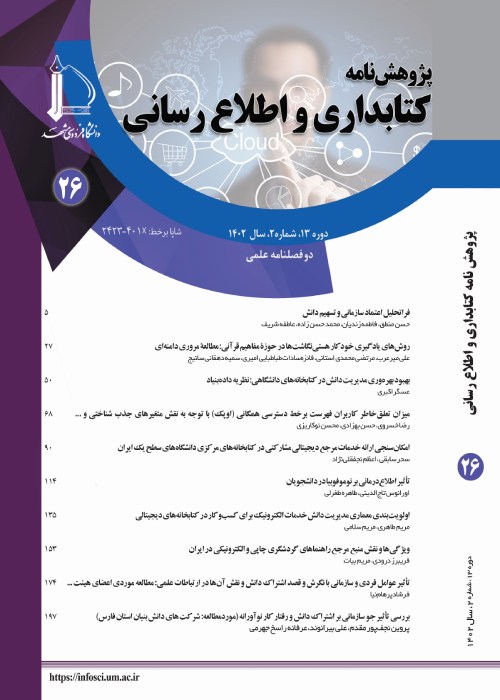Investigating Librarians’ Psychological Capital Status and Its Relationship with Their Conflict Management Strategies
Human resources are the main asset of any organization. The optimal use of this valuable asset has increased the need to pay attention to this enormous capacity. One of the issues that can erode the human resources of organizations and make them ineffective is the occurrence of conflict in interpersonal relationships. Although conflict is a common thing within organizations, and of course, the library environment and the professional life of librarians are not except, an important issue that should be taken into account is that conflicts must be managed to have appropriate professional interactions. The ability to manage and resolve conflict is not simple, and to achieve it, people must have special personal and psychological characteristics, so that with the help of these characteristics, one can experience unfortunate events and emotions and at the same time be able to solve personal and social problems. In this context, one of the important psychological characteristics that have been raised and emphasized in the field of human resources in the last two decades is psychological capital. Psychological capital is a state of positive psychological development and consists of four positive psychological resources including hope, self-efficacy, optimism, and resilience. Existing studies show the role of psychological capital in improving occupational health components, reducing tensions, and the psychological well-being of employees. Such consequences bring to mind the possibility that psychological capital can be a determining component in the process of conflict management and resolution. Based on this, the purpose of the current research was to determine library employees' psychological capital and its relationship in predicting conflict resolution strategies in the form of two statistical models
This research is quantitative research with a correlational descriptive methodology with practical goals. The statistical population of the research consists of public library librarians of Semnan province, which consist of 140 people. Using simple random sampling, 89 librarians (61 female and 28 male with average age of 34.32 years old) were selected from this population. The psychological capital questionnaire (PCQ) and conflict resolution questionnaire (CRQ) were used to collect data. To analyze the data, descriptive and inferential statistics methods including binomial test and structural equation modeling (SEM) used in SPSS and Smart-PLS software were used.
The results of the binomial test showed that the proportion of people in the group with a higher score in self-efficacy (73.49), hope (83.33), resilience (75), and optimism (71.43) was more than the group with a lower score in these variables. Also, in the total score of psychological capital, the proportion of people in the group with higher scores (77.38) was higher. But in conflict resolution strategies and its components, it was also found that except for the three components of conflict as positive and natural, focusing on the future and creating a mutual benefit agreement in other components, the difference between the groups is significant. In fact, the scores of the librarians of both groups are close to each other in these three components and have a small gap with the expected ratio, but in other components, the difference between the groups is significant and the observed ratios are higher for the group with high scores. In the general variable of conflict resolution, the scores of the group with a high score (77.53) are significantly higher than the group with a lower score (22.47). In addition, in the test of research models using SEM, the validity and reliability of psychological capital and conflict resolution measurement models were evaluated and confirmed. Then, in the examination of structural relationships, it was found that psychological capital can positively and significantly predict conflict resolution and explains about 42% of the variance of conflict resolution strategies. Also, among the 10 components of conflict resolution, this variable is capable of predicting the components of conceiving conflict as positive and natural, creating an atmosphere and situation of conflict resolution, clarifying, and providing solutions and goals. The calculation of the fitness indexes of the research models also indicated the optimal fitness of the assumed model with the data.
According to the results, the level of psychological capital of employees is acceptable, but not high. Also, in most of the conflict resolution strategies, the score of the sample is at the average level or slightly above the average, and especially in the three conflict strategies is relatively weak. Therefore, in the context of increasing the level of psychological capital and improving employee conflict management strategies, library managers should prepare actions and interventions. Revealing the role of psychological capital in determining the appropriate solutions to resolve conflicts that arise for employees in the work environment can promise to solve the shortcomings in this field. Using the findings of this research, actions can be taken to solve interpersonal problems and improve relationships in the work environment with the help of employees' internal capabilities.
- حق عضویت دریافتی صرف حمایت از نشریات عضو و نگهداری، تکمیل و توسعه مگیران میشود.
- پرداخت حق اشتراک و دانلود مقالات اجازه بازنشر آن در سایر رسانههای چاپی و دیجیتال را به کاربر نمیدهد.



